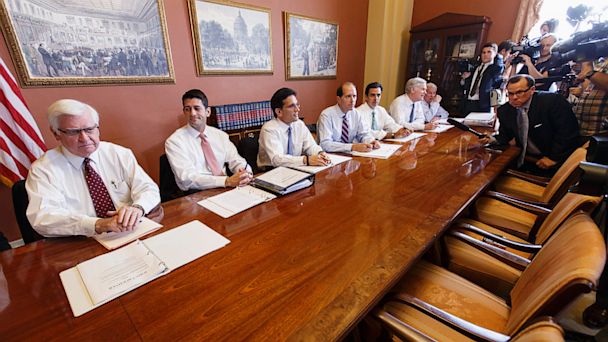House Republicans Wait at a Table for Dems to Negotiate Budget

J. Scott Applewhite/AP Photo
Eight House Republicans were appointed to negotiate a budget deal with Senate Democrats today and actually sat at a table to await some senators.
When no one showed up, the Republicans said it was an example of the Senate Dems' refusal to negotiate to reach a deal.
House Majority Leader Eric Cantor, joining seven other conferees appointed earlier this morning by House Speaker John Boehner, said "there is a way" for Republicans and Democrats "to work through our differences" but complained that Democrats have refused to negotiate.
"As you can see, there's no one here on the other side of the table," Cantor, R-Va., said. "It's fair to say none of us want to be in a shutdown, and we're here to say to the Senate Democrats, come and talk to us. This is how we resolve our differences and can work our way out of this kind of situation."
Cantor, who was heavily involved in deficit negotiations with Vice President Joe Biden in 2011, pointed to five separate attempts that the House has passed in recent days, and criticized Senate Democrats for defeating those efforts without broad debate.
"All of us here sitting at a table, waiting for the Senate Democrats to join us, so we can begin to resolve our differences," Cantor said. "The silliness that is caused by unwillingness to talk, is what we're trying to avoid, and we invite the Senate Democrats to come and join us so we can resolve our differences and work our way out of this situation."
The Government Shutdown Explained (Like You're an Idiot)
Other than Cantor, Budget Chairman Paul Ryan, Ways and Means Chairman Dave Camp, Appropriations Chairman Hal Rogers and four other members of Appropriations - Reps. Tom Graves, R-Ga., Ander Crenshaw, R-Fla., John Carter, R-Texas, and Rodney Frelinghuysen, R-N.J. were appointed to negotiate with Democrats.
Ryan, the former vice presidential nominee, said the government will also reach its debt limit in about two weeks.
"Most budget agreements in the past have always involved debt limit increases," Ryan, R-Wis., said. "We think that enforcing mechanism, just like the Budget Control Act that President Obama signed before, or like Bowles-Simpson, or like Gramm-Rudman or like the 1997 or 1990 budget agreements, all of those budget agreements came together because of debt limits. That's what we think will be the forcing action to bring us - the two parties - together."
The Most Surprising Consequences of a Government Shutdown
The Senate dismissed the House invitation to negotiate a deal, voting on party lines - 54 to 46 - to table the House's message calling for a conference committee on the continuing resolution.
Ryan condemned Democrats for tabling the GOP's motion to go to conference with the Senate.
"We want our colleagues to come here and work with us. We want to sit down and get this done. We don't want to close the government down, we want it to open, but we want fairness," he said. "We want fairness for all Americans. We don't want to treat people differently. We want a budget agreement that gets the debt under control, we want to grow the economy, and that's what we're here to do."
The standoff is over House Republicans' demand that Obamacare be defunded or part of Obamacare by delayed. Senate Democrats refuse to allow Obamacare, which goes into effect today, be part of the budget negotiations.
Senate Majority Leader Harry Reid then took the floor to say the government shutdown amounts to a "good day for the anarchists."
"Speaker Boehner and his band of Tea Party radicals have done the unthinkable. They've shut down the federal government," Reid said.
"It's too late to avert the worst effects of the shutdown, but it's not too late to send the federal employees back to work," he said, calling on the House to vote on a clean spending bill.
But Senate Republicans were quick to blame the Democrats for the closing of government.
"Democratic leaders in Congress finally have their prize - a government shutdown that no one seems to want but them," Senate Minority Leader Mitch McConnell said.